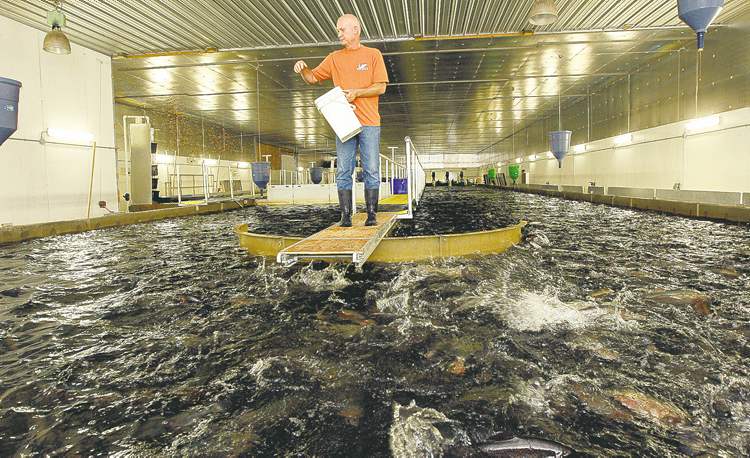Fish farm has rainbow connection
Watersong trout facility a costly commitment
Advertisement
Read this article for free:
or
Already have an account? Log in here »
To continue reading, please subscribe:
Monthly Digital Subscription
$1 per week for 24 weeks*
- Enjoy unlimited reading on winnipegfreepress.com
- Read the E-Edition, our digital replica newspaper
- Access News Break, our award-winning app
- Play interactive puzzles
*Billed as $4.00 plus GST every four weeks. After 24 weeks, price increases to the regular rate of $19.00 plus GST every four weeks. Offer available to new and qualified returning subscribers only. Cancel any time.
Monthly Digital Subscription
$4.75/week*
- Enjoy unlimited reading on winnipegfreepress.com
- Read the E-Edition, our digital replica newspaper
- Access News Break, our award-winning app
- Play interactive puzzles
*Billed as $19 plus GST every four weeks. Cancel any time.
To continue reading, please subscribe:
Add Winnipeg Free Press access to your Brandon Sun subscription for only
$1 for the first 4 weeks*
*$1 will be added to your next bill. After your 4 weeks access is complete your rate will increase by $0.00 a X percent off the regular rate.
Read unlimited articles for free today:
or
Already have an account? Log in here »
Hey there, time traveller!
This article was published 30/07/2012 (4792 days ago), so information in it may no longer be current.
NEAR WARREN — Feeding time is a bit like when the footbridge opens on evil henchwoman Helga Brandt, plunging her into a pool of starving piranhas in the James Bond flick You Only Live Twice.
At Watersong Fish Farm, the rainbow trout fight for position like dinner guests at a boarding house. They furiously stir the water, bringing it to a boil, their dorsal fins ominously knifing through the water’s surface.
Fish farming. You’ve no doubt read the stories. But you probably only read about new fish farms starting up. You probably didn’t read about how, one by one, they’ve failed.

Watersong Fish Farm, run by Rudy and Leslie Reimer, is the culmination of all that: a push by governments and the Reimers to figure out how to make indoor fish farming viable. (Many people will recognize the Reimers as the proprietors of Riddell’s Roasters, a long-time farm-to-consumer chicken farm.)
“No one argues we won’t have to farm fish (to preserve lake and ocean aquatic populations). Over 50 per cent of our seafood now comes from aquaculture,” said Rudy.
But most of that aquaculture is caged fish farming, where fish are kept in cages in a lake or ocean, or flow-through aquaculture, where water from a river is borrowed and returned. A closed containment system, like at Watersong, is considered the most environmentally friendly, according to the David Suzuki Foundation and other environmental groups.
The fish are beautiful. Rainbow trout have the famous lipstick smears down the sides, and their rich green backs are peppered with black polka-dots. There are 38,000 of them here. They’re not docile, the way livestock often is. The water is alive.
They are kept in two “raceways,” which are like wide lanes in an Olympic pool, and it seems as if the fish are always running qualifying rounds. The raceways are almost 45 metres long and two metres deep.
The Reimers started aquaculture in 2009 through a federal-provincial initiative to fund six indoor fish farms across the country. The Reimers applied and were accepted, but the other five proposed fish farms were dropped.
The federal and provincial governments paid for the equipment and fish tank. The Reimers supplied the building, well and operating costs.
Of the $1.4 million invested so far, the Reimers’ costs have been about $450,000 and they’ve taken no money out for their labour. Government is using the project for data for future regulations and investment houses. No bank will lend money unless a venture such as this can be shown to be viable.
It’s taken several years to get up production. As Rudy put it: “The first challenge is producing the fish. The second challenge is marketing.”
The second challenge began in March. The Reimers have been shipping fish, harvested at about two kilograms, once a week for processing to Wild West Steelhead, near Diefenbaker Lake in southwest Saskatchewan. Wild West also purchases 90 per cent of Watersong’s fish for its wholesale arm. But it’s a long, 24-hour round trip, for the Reimers, and shipping eats up close to 20 per cent of their return.
So the Reimers have been holding back 10 per cent of the processed fish to sell off their farm near Warren, about 30 kilometres north of Winnipeg. It’s something they’re good at. Riddell’s Roasters was started by Leslie’s parents Chris and Helen Riddell — the farm has 25,500 chickens and 1,000 regular farm-gate customers.
But the Reimers need to sell more. They can make five times the wholesale price by selling the processed fish off their farm to customers, restaurants and retailers. Rainbow trout is from the same family as salmon and, therefore, a higher-value fish. Leslie jokes they have become a “fish and chicks” shop. In addition to trout filets, they also sell smoked trout.
Know your farmer is the Reimers’ mantra. Customers drop in all the time. They hope their model will be the key to making theirs one of the first indoor fish farms to succeed in Canada. (The province did not respond by press time with perspective on its fish-farm investment.)
“I just think it’s good for the consumer to see where their food actually comes from,” said Leslie.
Watersong’s website is currently under construction but the Reimers can be reached at 1-877-322-5558.
bill.redekop@freepress.mb.ca

